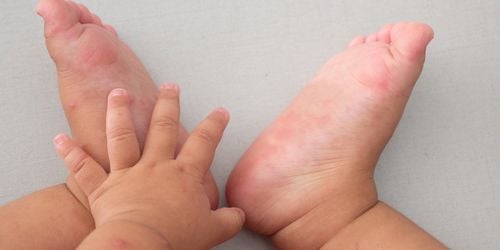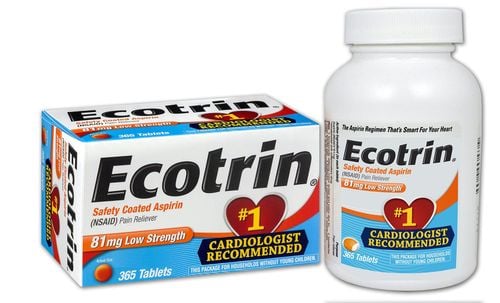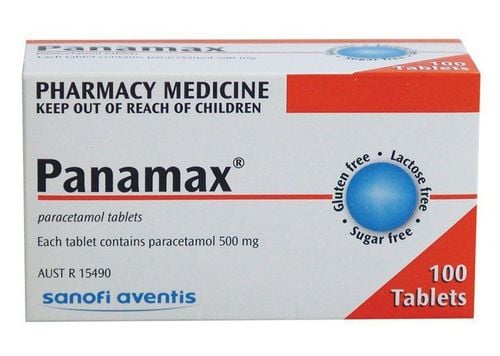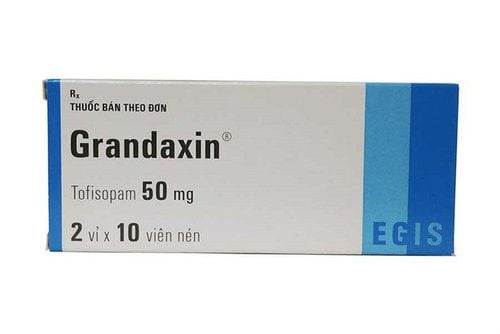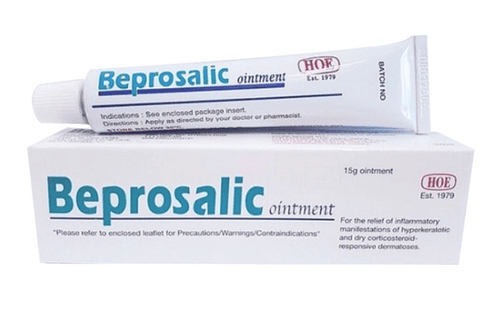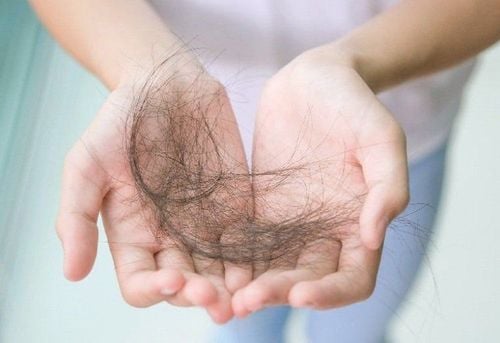Hand-foot-mouth disease is quite common in young children. If treated and cared for properly, children will recover quickly without complications. So, what medication should be applied for children with hand-foot-mouth disease?
1. Causes and symptoms of hand-foot-mouth disease in children
Hand-foot-mouth disease is an acute infectious disease caused by viruses. The disease often presents with mild symptoms and resolves on its own after a few days. While people of all ages can contract hand-foot-mouth disease, it is most commonly seen in children under 5 years old. This disease is highly contagious, and the virus can spread from an infected person to a healthy one through direct contact with saliva, respiratory secretions, or fluids from blisters, stool, or indirectly through contaminated surfaces (such as toys, tables, chairs, plates, and cutlery) that have not been cleaned properly.
Hand-foot-mouth disease is caused by a group of common enteroviruses, including Coxsackievirus A16 and Enterovirus 71 (EV71). Among these, Coxsackievirus A16 is the most common cause, presenting with mild symptoms, few complications, and usually resolves on its own. Enterovirus 71 often causes more severe disease, leading to dangerous complications and even death.
When children contract hand-foot-mouth disease, they often exhibit symptoms such as:
- Mouth pain.
- Sore throat.
- Crying, poor appetite, vomiting.
- Fever usually below 38.3°C. High fever and frequent vomiting may indicate severe complications.
- Red sores or blisters with a diameter of 2-3 mm on the mucous membranes of the mouth, gums, and tongue. Children may drool due to increased saliva production.
- A rash in the form of blisters on the palms of the hands, soles of the feet, knees, and buttocks.
2. What medication should be used for children with hand-foot-mouth disease?
Currently, there is no specific medication for treating hand-foot-mouth disease; the treatment primarily focuses on managing symptoms and waiting for the disease to pass. Children with complications must be hospitalized for monitoring and timely treatment.
Medications commonly used in the treatment of hand-foot-mouth disease in children include:
- Antipyretic and pain-relieving medications: Use medications such as paracetamol or ibuprofen if the child has a fever and significant pain. Do not use aspirin for children with viral infections, as it may cause Reye's syndrome. These medications are primarily for pain relief, so even if the child is not feverish or only has a mild fever, they can still be used. The dosage for paracetamol is 10-15 mg/kg per dose, repeated every 4-6 hours, not exceeding 5 doses per day; for ibuprofen, 10 mg/kg per dose, repeated every 6-8 hours.
- Hydration and electrolyte replacement: Since the child may have fever and diarrhea, leading to dehydration and electrolyte loss, giving the child oral rehydration solutions (ORS) or hydrite is recommended. Ensure the solution is prepared according to the instructions on the packaging or as directed by the doctor.
- Skin lesion care: For the skin lesions caused by hand-foot-mouth disease, no special care is typically needed, as the blisters often resolve on their own. Just maintain hygiene, trim the child’s nails to prevent scratching, which could lead to infection. For large, broken blisters that are at risk of infection, antiseptic creams such as methylene blue or silver ion creams can be used. However, many parents make the mistake of applying medication to all the skin lesions of the child, which is not effective in treating the disease. Doing so may cause side effects if the child touches the medication and then puts their hands in their mouth, or if the medication is absorbed systemically when applied in excessive amounts.
- Treating mouth sores: For mouth sores, a borax glycerin solution can be used to clean the child’s mouth before and after meals. Oral gels such as Kamistad or Zyttee can also be used to disinfect and reduce pain, making it easier for the child to eat.
- Antihistamines: If the child is itching excessively and scratching, leading to abrasions and a risk of skin infections, the doctor may recommend antihistamine medications to help relieve the itching.
To use medications safely for children with hand-foot-mouth disease, you need to note:
- Absolutely do not give the child an overdose or use medication not prescribed by the doctor.
- Antibiotics should only be used if bacterial superinfection is confirmed and should only be used when prescribed by a doctor.
- Antiviral medications like acyclovir and other antiviral drugs are not effective in treating hand-foot-mouth disease.
- If the child is itching a lot, oral antihistamines or topical creams may be used.
- You should take your child to the doctor for an accurate assessment of their condition, so that a proper medication regimen can be prescribed to help them recover quickly.
3. Medications not recommended for hand-foot-mouth disease
Many parents, feeling anxious when their child contracts hand-foot-mouth disease, often purchase topical medications to help their child recover quickly and reduce symptoms like pain, itching, and infection.
However, skin lesions caused by hand-foot-mouth disease are usually painless, so applying medication for pain relief is unnecessary. In particular, topical medications with local anesthetic effects or pain relief are not recommended by doctors for this condition.
For mouth lesions that may cause pain and lead to poor appetite, oral medications should not be used, especially in children under 3 years old, unless prescribed by a specialist.
The blisters in the skin lesions of hand-foot-mouth disease rarely rupture. They usually shrink, dry up, and disappear without leaving scars, so there is usually no need to apply antiseptic medication. Only use antiseptics for large, ruptured blisters or for lesions in areas prone to infection, such as the genital area, to prevent secondary infection.
- Do not use corticosteroid-containing topical medications for children with hand-foot-mouth disease: Topical medications containing corticosteroids may cause side effects that suppress the immune system and worsen the condition.
- Do not use unlicensed topical medications, as they may cause allergic reactions or skin irritation.
Some parents apply acyclovir to children hoping to kill the virus and help them recover faster. However, acyclovir is completely ineffective against the virus causing hand-foot-mouth disease.
Currently, the Pediatrics Department at Vinmec International General Hospital is a reliable place for diagnosing and treating conditions that newborns and young children are susceptible to, such as viral fever, bacterial fever, respiratory infections, infectious diseases, and hand-foot-mouth disease. With modern equipment and sterile environments, the hospital minimizes risks of disease transmission. Additionally, Vinmec provides multidisciplinary services in combination with a nutrition specialist to create tailored meal plans, ensuring children develop healthily at every stage.
Vinmec International General Hospital, with its state-of-the-art facilities and a team of experienced doctors and specialists, provides parents with peace of mind when seeking medical care for their children.
To arrange an appointment, please call HOTLINE or make your reservation directly HERE. You may also download the MyVinmec app to schedule appointments faster and manage your reservations more conveniently.




